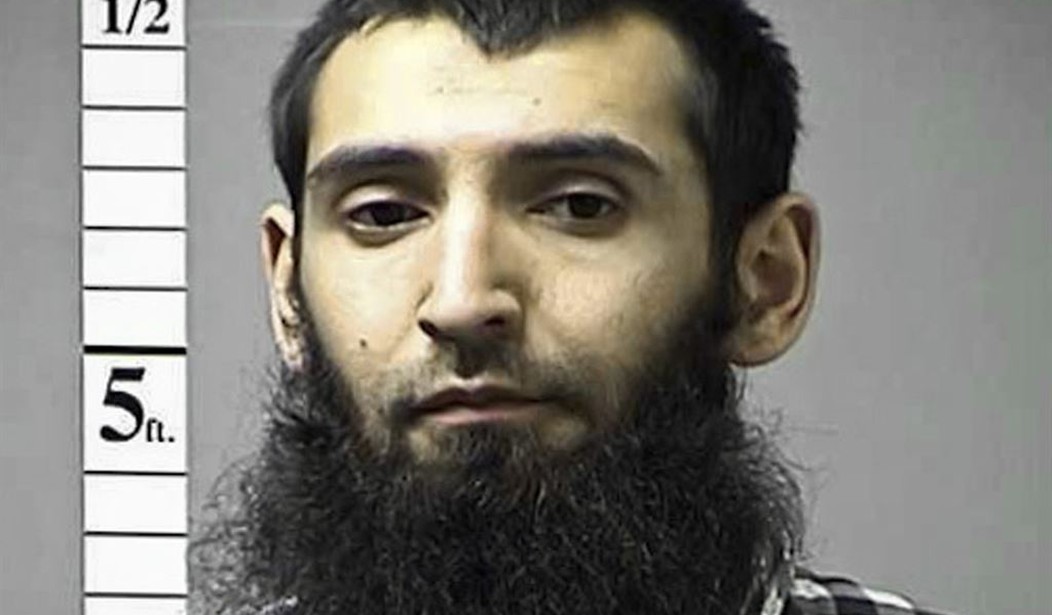Sayfullo Saipov, who entered the U.S. on a diversity visa, showed his gratitude by driving a truck along a bike path in New York City on Halloween night in 2017, murdering eight people. In Manhattan federal court on Wednesday, he was sentenced to life in prison and took the opportunity to explain that as far as he was concerned, his murders were a form of devotion to his God.
Just at a time when the FBI has shifted its focus from dealing with actual terrorists to treating patriotic Americans who oppose the Biden regime as terrorists, Saipov provided a bracing reminder of the fact that there are still Islamic jihad terrorists in the U.S. and around the world, and they very much want to do us harm.
Gothamist reported Wednesday that emotions were running high in the courtroom as Saipov was sentenced. Judge Vernon Broderick gave him the longest possible sentence, 260 years in prison, on top of several life sentences. As he did so, he said that Saipov’s attack was “among the worst, if not the worst, I’ve ever seen.”
Gothamist noted that “loved ones of the deceased and survivors of the attack described the birthdays and holidays they could no longer celebrate with their spouses, children, or siblings. They spoke about the sleepless nights, the missed graduations and weddings. They explained how their lives have forever changed, and struggled to make sense of Saipov’s motivations.” Others called him a “monster,” as well as a “coward.”
One woman whose sister was killed in the attack asked Saipov: “Who are you? Why do you think you have the right to decide who lives or dies?” Another woman, whose father was murdered by Saipov, said to him: “This god you believe in, let him forgive you, because I never will.” Her reference to the deity was apposite; as for Saipov, his attack was all about serving his God.
Assistant U.S. Attorney Amanda Houle noted that Saipov had “shown no remorse, even after spending five years in solitary confinement.” She added: “He delights in the suffering he has caused these victims. He is proud of it.” She didn’t explain how or why anyone could be proud of gratuitously taking lives and causing people so much pain, but Saipov himself made it clear when he got a chance to speak.
According to Gothamist, Saipov “did not apologize.” On the contrary, he delivered a long-winded address that turned out to be a justification for his crimes. Gothamist called it a “lengthy religious speech, spanning from Adam and Eve to the creation of the Islamic caliphate. Through an interpreter, he called ‘jihad,’ or fight against the enemies of Islam, the highest form of prayer.” That revealed why he never showed any remorse, even during all those long and difficult years of solitary confinement.
As a true believer in Islam, Saipov believed that he had fulfilled the command of Allah to “kill them wherever you find them” (Qur’an 2:191; 4:89, cf. 9:5). How could he be expected to show remorse for performing a supreme act of worship commanded by the being he believed to be the only true God?
Related: Ex-Uber Driver Who Murdered Eight People in NYC Was in the U.S. on a Diversity Visa
Saipov, said Gothamist, “closed his speech by saying that he had heard the victims during the trial — that he figured their tears could fill a handkerchief. But he said the tears and blood of killed Muslims could fill the entire courtroom. Then he praised Allah, just as he did at the end of his attack.” In that he was not alone: “One of the survivors, Rachel Pharn, also closed her speech by praising Allah, while also condemning and questioning Saipov’s actions. ‘Let’s be clear. Your actions did not serve Allah,’ she said. ‘Your actions served no one but yourself.’” It is a peculiar malady of our age that people can be physically injured by something and yet still refuse to believe in the existence of that which injured them.
Unfortunately for Rachel Pharn, as well as for all the other people who were victims of Saipov’s attack, the Qur’an, as well as Islamic tradition and law, does teach warfare against unbelievers and contains numerous exhortations to do violence against them. Sayfullo Saipov likely also expressed no remorse because the Qur’an tells Muslims that they are to serve as the executors of the wrath of Allah: “Fight them, and Allah will punish them by your hands, and he will lay them low and give you victory over them” (9:14). When Muslims do this, Allah will “heal the hearts of people who are believers, and he will remove the anger of their hearts” (9:14-15). Saipov’s serenity stems from this: he has fought the unbelievers, and Allah has therefore healed his heart. How could he have any remorse for that?










